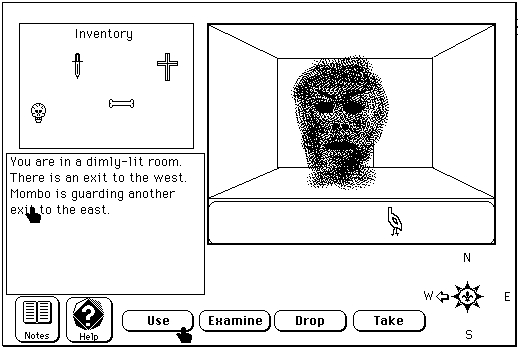It’s coming up to the 25th anniversary of HyperCard, and I’m reminded of how much that application played a role in my thinking and working at the time. Developed by Bill Atkinson, it was really ‘programming for the masses’, a tool for the Macintosh that allowed folks to easily build simple, and even complex, applications. I’d programmed in other environments : Algol, Pascal, Basic, Forth, and even a little Lisp, but this was a major step forward in simplicity and power.
 A colleague of mine who was working at Claris suggested how cool this new tool was going to be, and I taught myself HyperCard while doing a postdoc at the University of Pittsburgh’s Learning Research and Development Center. I used it to prototype my ideas of a learning tool we could use for our research on children’s mental models of science. I then used it to program a game based upon my PhD research, embedding analogical reasoning puzzles into a game (Voodoo Adventure; see screenshot). I wrote it up and got it published as an investigation how games could be used as cognitive research tools. To little attention, back in ’91 :).
A colleague of mine who was working at Claris suggested how cool this new tool was going to be, and I taught myself HyperCard while doing a postdoc at the University of Pittsburgh’s Learning Research and Development Center. I used it to prototype my ideas of a learning tool we could use for our research on children’s mental models of science. I then used it to program a game based upon my PhD research, embedding analogical reasoning puzzles into a game (Voodoo Adventure; see screenshot). I wrote it up and got it published as an investigation how games could be used as cognitive research tools. To little attention, back in ’91 :).
While teaching HCI, I had my students use HyperCard to develop their interface solutions to my assignments. The intention was to allow them to focus more on design and less on syntax. I also reflected on how the interface encapsulated to some degree on what Andi diSessa called ‘incremental advantage’, a property of an environment that rewarded greater investments in understanding with greater power to control the system. HyperCard’s buttons, fields, and backgrounds provided this, up until the next step to HyperTalk (which also had that capability once you got into the programming notion). I also proposed that such an environment could support ‘discoverability’ (a concept I learned from Jean Marc Robert), where an environment could support experimentation to learn to use it in steady ways. Another paper resulted.
I also used HyperCard to develop applications in my research. We used it to develop Quest for Independence, a game that helped kids who grew up without parents (e.g. foster care) learn to survive on their own. Similarly, we developed a HCI performance support tool. Both of these later got ported to the web as soon as CGI’s came out that let the web retain state (you can still play Quest; as far as I know it was the first serious game you could play on the web).
The other ways HyperCard were used are well known (e.g. Myst), but it was a powerful tool for me personally, and I still miss having an easy environment for prototyping. I don’t program anymore (I add value other ways), but I still remember it fondly, and would love to have it running on my iPad as well! Kudos to Bill and Apple for creating and releasing it; a shame it was eventually killed through neglect.
Hypercard allowed me to keep track of all my graduate student research in the late 1980s as well as teach myself simple programming (as a literature major) to make fun things happen. Hypercard also let you create what were basic multimedia presentations and “e learning”–at one college, people were using it to run videodisks (remember those?) to help with writers’ workshops. Hypercard is the reason I understood Filemaker immediately when it came out, and it taught me the very fundamental database concepts that are still applicable today with SQL and even XML concepts. I never understood why it went away.
My friend Chris Anderson (who, if you don’t know, I should introduce you to) has developed a HyperCard-inspired iPad app called Infinite Canvas. You can author new files for it on the desktop (using HTML5) and he’s beta testing an authoring environment inside the app.
It’s in the app store and free. There will be paid content available for in-app purchase and a mechanism for third-party authors to sell content.
…Richard
If there is one thing that would get me to buy an iPad it would be a Hypercard-type app. Thanks for the info Richard!
I was delighted for a time with the online version (TileStack, I believe), that would run old stacks online, but it is, alas, no more.